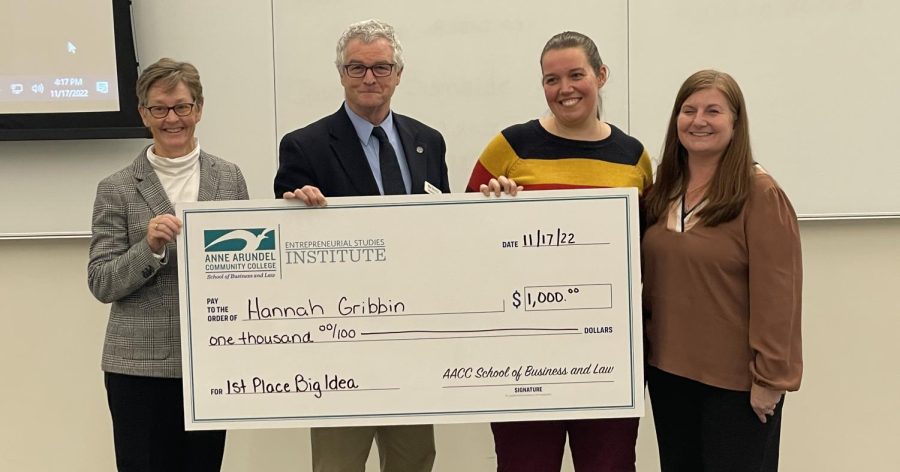Students win money for business ideas
First-year entrepreneurship student Hannah Gribbin claims first prize for her business idea at the 13th annual Big Idea competition.
November 22, 2022
Student entrepreneurs won a total of $2,250 in awards to help them make their business ideas a reality on Thursday.
First-year entrepreneurial student Hannah Gribbin, who claimed first prize in the Entrepreneurial Studies Institute’s 13th annual Big Idea Copetition, described earning first place as “crazy,” saying she was on the edge of her seat as entrepreneurship faculty members announced the winners.
I was “getting more and more excited every time they [the hosts] didn’t call my name,” Gribbin, who runs a business that delivers baked goods by boat, said. “It kind of became this all or nothing feeling and my heart was beating really fast because either I’d won the whole thing or I wasn’t gonna win anything at all.”
Almost 60 students, faculty and family members attended the awards ceremony in the Health and Life Science building’s lecture hall. At the event, ESI awarded five prizes totalling $2,250 to the winners: $1,000 for first place, $500 for second place, $250 for third place, $250 for a voted-on fan favorite and another $250 for an idea focused on bettering the wider community surrounding the college.
The Philip E. and Carole R. Ratcliffe Foundation funded the prizes as part of a $300,000 donation earlier this fall. Foundation CEO Carlene Cassidy said the goal of the Big Idea competition is to give rising entrepreneurs the opportunity to refine their ideas and get them ready for the “Shark-Tank”-style “Big Pitch” competition in the spring.
“It’s a really good way for them to get validation that their ideas are good ideas, give feedback on how they could tweak [those ideas], and then for where you go next,” Cassidy, a former entrepreneurship academic chair who started the Big Idea competition almost 20 years ago, said.
Gribbin agreed, saying this contest is a “good primer” for the pitch competition next semester because it acts as an entry point for entrepreneurs who are just starting to formulate a business idea but don’t have a detailed plan.
“It’s a lot of work to have a business plan ready for review, especially when a business is really in its infancy,” Gribbin said. Adding the competition rewards students who have a good idea, but not a sophisticated business plan.
Second-year massage therapy student John Tevis, who won second place, agreed, saying he enjoyed not needing to have everything figured out before pitching.
“I like that there’s a low barrier of entry,” Tevis, who pitched an idea to install electric motors in vintage gas cars, said. “It’s not a formal business plan, so there’s less pressure.”
Forty-three students submitted two-minute videos explaining their ideas before the Oct. 31 deadline. The judges then selected 11 to advance as finalists whose 2 minute pitch videos were shown at the awards ceremony.
Entrepreneurial studies Academic Chair Stephanie Goldenberg, who coordinated the event, said the process “motivates students to practice creative thinking, design, thinking, innovation, and … how to verbally express their idea and then enhance it with other creative elements.”












